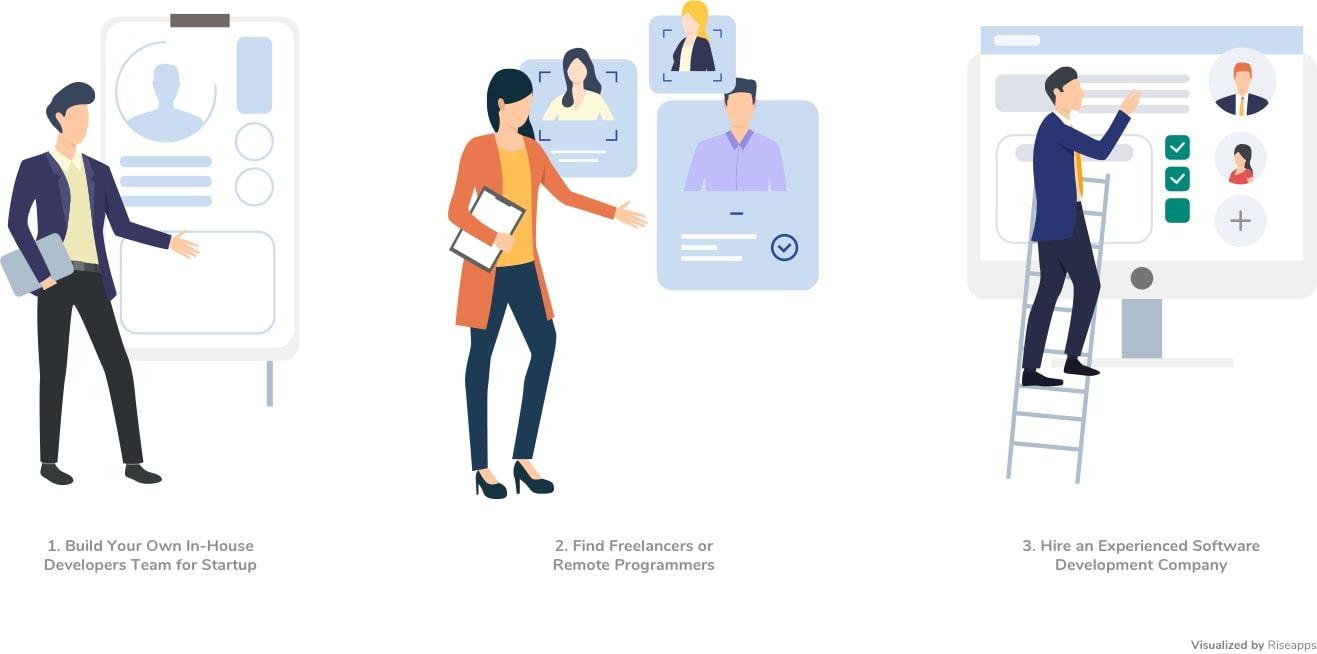How to Choose a Developer for Your Early Stage (Before Series A) Startup?

Dealing with programmers might not be a piece of cake, hiring them can be even more complicated. In this article you will find tips that help you answer the question “How to hire a programmer?”.
Who’s a Developer for Your Startup?
Technical Skills and Expertise
To find what you need, at first, you should understand what you are looking for. Trivial it may sound; the question stays relevant.
To justify you are worth going for a pre-seed and get ready for a series A you need to:
- build a product and deploy it with early customers;
- demonstrate the market fit and provide sales dynamics, supporting growth;
- have the team that is ready to implement all of that.
Are you looking for a CTO for your startup who will also be your co-founder or a person/group of people to code? That vital is to get it straight, as it will define your search.
If you are looking for a CTO, you might be interested in doing some networking and see where you can get with it. According to the theory of the 6 handshakes, chances are you already know the person you are looking for. To get ready for the talk with this person, we suggest doing your research about the technologies that will be used for your product. It’s beneficial for yourself so that you know the language developers will use, and you can pitch them the way it sounds professional and knowledgeable. For instance, you are developing and web-based project, and you start looking for a developer that is great with Kotlin. That doesn’t make any sense. So, our advice here is to do some homework and get some understanding of the core concepts.
In case you already have a CTO with the relevant expertise in the technologies you need, and you want to build a team for an MVP, you can follow 3 strategies:
- find developers to work in your office and be a part of your core in-house team;
- hire remote programmers and freelancers to complete separate tasks;
- outsource the whole software development team.
Read Also: In-house Software Development vs. Outsourcing. How to Make the Right Decision?
We’ll cover each of these strategies later in this article.
Things to Consider
To decide what strategy to follow, you need to consider:
- budget;
- time;
- team scalability;
- risks;
- readiness to hire developers for startup for the long run.
Let’s elaborate a bit on each of the points above.
Budget
The budget you have defines the amount of work you can afford. If you already have some money, you can hire a team to create an MVP good enough to impress the investors in the pre-seed/seed round. Unless you have no luxury to hire the team, you can find a developer for your startup, who is willing to work for equity.
Time
We always lack it, and we typically need everything done yesterday. However, hiring the team and rushing isn’t the case there. It’s better dedicated time to find a reliable, skilled partner, should it be one developer or a full team. The more thorough you are at the filtering candidates; the better choice is made. The risks are high.
Team scalability
Make sure decisions done at this stage won’t jeopardize your scalability plans. Maybe, you won’t need to build a scalable team of developers within your startup even for the future, and you will be lucky to sign a long-term agreement with the out poured software team for development and ongoing support. Anyway, you need to think it’s over.
Risks
Building startups is risky. What happens in the worst-case scenario? What happens if you don’t get enough funding? How many attempts to succeed will you handle? What if a hired freelancer gets ill, or you can’t reach him when he is most needed? What if your competitors lure your best talents? Well, in the last case, dealing with the outsourced team is the least risky option, as you are signing a contract, that is to protect you. Whatever your risks are, identify them, and draft the ideas of how you can overcome them.
Read Also: IT Outsourcing to Eastern Europe. How to Do it Successfully?
Readiness to hire developers for startup for the long run
This is vital. In case you are looking for the job done, and don’t expect your developer to be a part of your brand, your core team, spread your values – you are hiring contractors, to have the work done within a stated budget and deadlines, and go further (suits best for the non-tech startups). If it’s not your story, the best way is to build a software development team inside your company, from the very beginning and start thinking about how to hire a programmer for a startup as early as possible.
Cultural Fit – This is Important
Here we’ll be brief. Cultural differences boil down to different attitudes to business, time, deadlines, etc. You are working hard to have your dream come true, and it can be tremendously satisfying just to pursue this road with people on board, who share the same values and the same attitude. Think twice about this aspect, when hiring developers from other countries, even though they may demand lower rates, the issues in the work process as a result of the cultural chasm may bring disbalance to your core team.
3 Most Popular Ways to Find Developers for Your Startup
Having considered all issued written above, let’s review three of the most popular ways to supplement your startup’s team with tech expertise. We review the pros and cons of each way for you to make an informed decision. We consider the following scenario: you what to get people who can build your startup’s MVP.

- Build Your Own In-House Developers Team for Startup
| + | – |
| You are building a dedicated and loyal team in your company. | The long hiring process of developers with the needed expertise, soft skills, and experience in your sector. You need to hire them in one by one, meaning that some parts of work stay incomplete until you find a person. |
| They are motivated to develop themselves inside the project for the sake of the project. They are building their product, getting financing, and hitting the market. It’s vital to share common goals. | Extra expenses you need to pay, e.g., taxes, insurance, sick leaves, purchase of hardware and software, office rent, etc. Moreover, in-house developers are on the payroll, if they are “sitting on the bench”, as you don’t want to lose good workers. |
| You can build your global culture, and make every employee become a representative of your startup. | Governmental protection of workers, so they are tough to fire. |
| All communication goes faster, as you are working in one office and in one time-zone. | High salary rates. There is an average industry salary that you need to consider before hiring skilled software engineers. |
| In-depth product knowledge, as the team is working on your project day by day and can communicate with other team members and the CEO seamlessly. | In-house developers need to build workflow and processed on the go, making mistakes, and spending extra time on management. |
- Find Freelancers or Remote Programmers
| + | – |
| You can find skilled professionals with low rates. | You spend so much precious time to find developers, PMs, designers, etc., going through may websites and reading dozens of reviews. Pretty tiresome. |
| You are paying only for the completed work, and not cover any other expenses. | You need to spend time to set the management between all your remote programmers. To develop a project, you need to have a PM, a developer with the tech expertise you need, a QA engineer, and a designer. Imagine all of them are separate freelancers that work remotely in different time zones. You need to manage them anyhow and make them cooperate. You need substantial effort, time, and a strong stomach. |
| You can access the big pool of talented developers. | Collaboration may not be as easy as it may seem, as you can be in a different time zone with a developer. |
| It’s difficult to achieve transparency. | |
| You have additional complications, connected to signing NDAs. |
- Hire an Experienced Software Development Company
| + | – |
| You are working with the ready team: PM, designer, developer, QA engineer. | The remote development team may lack knowledge about your product. They have only the information that you have told them. |
| You can find a team with low rates and high expertise. | You still may have a problem working in different time zones. |
| The team starts to work for your project straight away, as they already have all workflow and the process settled. | You need to make an effort in keeping everyone in the rest of your team updated. |
| You get one point of contact to collaborate with the team, which makes management easy and transparent. | Sometimes you may need to meet the team members in person, thus be ready for unplanned expenses. |
| You get the expertise, matured from many projects. The team has already made mistakes and learned from them; thus, they can deliver exceptional projects on time. | You may face tech issues, as not all hardware and software platforms are not compatible with each other. |
| You have legal guarantees that the work is done, people won’t go anywhere, and your ideas will stay yours. You sign a contract with the legal entity and an NDA, that’s it. |
To find more about the advantages and disadvantages of dealing with an experienced software development company, go here.
Now it’s up to you to make your choice.
Where to Look for Developers?
Once the road is taken, let’s see where you can find developers, freelancers, teams for your startup.
In-house Developers:
- The best way is to do networking to find the core people for your team. Try not to hire the stars, as they are sometimes overpriced, challenging to deal with, and you put yourself in a risky position: if they leave the company, the development may fall apart.
- Another way of how to find a developer for your startup is to hire a recruiter that can help you build the team. Experienced recruiters can have a good network, and thus it may take less time for them to find the right people.
- Collaborate with the universities, tech schools, it-trainers, they may recommend you promising students. It’s a great way to find people when you are doing something extraordinarily new and need people to think out of the box.
- Visit different meetups and networking events.
- Search on LinkedIn. Maybe some people from the startup like yours would like to change their workplace.
Freelancers:
- Go for websites, such as Upwork, We Work Remotely, Working Nomads, Go Remote, Remote Jobs, Flexjobs, Remote co, etc.
- Try yourself in LinkedIn groups and search
- Check Redditt, Stack overflow, GitHub
- Don’t forget about the networking
Software Development Companies:
- Visit development conferences
- Ask for recommendations inside our network, talk to investors, accelerators, funds
- Check directories such as Clutch, GoodFirms, Extract, Upwork, etc. You can find companies, their projects, and what’s the most important reviews.
Conclusion
We’d recommend you approach the search for developers with a deep understanding of whom you are looking for: a partner or a development team.
The rule that works for all strategies is to know what you want your developers to do. Should it be mobile or web development? Native or cross-platform? Moreover, do some research to get a brief understanding of the tech language, to pitch developers, and to sound convincing.
The next important issue that influences how to find software developer for startup is budget as it defines the way you are going to collaborate with developers and how will you pay them.
Furthermore, take your time and don’t rush. Have the future of your project in mind, and only then decide what is the best fit for your development: own team, group of freelancers, or you trust professional development team with the experience to deliver projects. Don’t miss your shot.
P.S. How to hire a developer for startup? Remember whom you are looking for and go for it.
Contact Us




